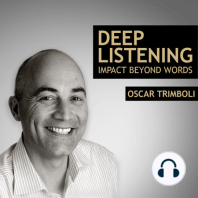4 min listen

Zoom fatigue and exhaustion - how it negatively impacts women more with Dr Anna Carolina Muller Queiroz
Zoom fatigue and exhaustion - how it negatively impacts women more with Dr Anna Carolina Muller Queiroz
ratings:
Length:
27 minutes
Released:
Sep 10, 2021
Format:
Podcast episode
Description
Zoom Fatigue is a well-documented phenomenon. It is more draining and depleting for women than men. There is a Zoom Exhaustion & Fatigue Scale (ZEF Scale) you can take the survey via https://vhil.stanford.edu/zef/ Dr. Anna Queiroz is a post-doctoral researcher at the Virtual Human Interaction Lab and at the Graduate School of Education at Stanford University. Written in collaboration with Fauville, Luo, Beilesnon and Hancock - 'Nonverbal Mechanisms Predict Zoom Fatigue and Explain Why Women Experience Higher Levels than Men'. During this discussion with Anna, we explore the impact of fatigue while listening on a video conference. It's important to understand that Zoom fatigue and exhaustion has of five different elements. They are emotional, motivational, visual, social, and general fatigue. We explore the techniques you can use as a host and guest to improve the quality of the video conference - what to do before, during, and after the video conference to reduce exhaustion and fatigue. Listen for free Zoom Exhaustion & Fatigue Scale - https://stanfordvr.com/pubs/2021/zoom-exhaustion-fatigue-scale/ Stanford researchers identify four causes for ‘Zoom fatigue’ and their simple fixes https://news.stanford.edu/2021/02/23/four-causes-zoom-fatigue-solutions/
Released:
Sep 10, 2021
Format:
Podcast episode
Titles in the series (53)
How to listen when they hold strong views?: Answer My Questions #AMQ by Deep Listening - Impact beyond words - Oscar Trimboli